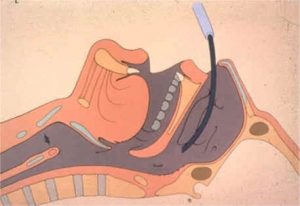- Home
- Editorial
- News
- Practice Guidelines
- Anesthesiology Guidelines
- Cancer Guidelines
- Cardiac Sciences Guidelines
- Critical Care Guidelines
- Dentistry Guidelines
- Dermatology Guidelines
- Diabetes and Endo Guidelines
- Diagnostics Guidelines
- ENT Guidelines
- Featured Practice Guidelines
- Gastroenterology Guidelines
- Geriatrics Guidelines
- Medicine Guidelines
- Nephrology Guidelines
- Neurosciences Guidelines
- Obs and Gynae Guidelines
- Ophthalmology Guidelines
- Orthopaedics Guidelines
- Paediatrics Guidelines
- Psychiatry Guidelines
- Pulmonology Guidelines
- Radiology Guidelines
- Surgery Guidelines
- Urology Guidelines
Ultrasound guided technique for ibSLN block improves quality of anaesthesia

Ultrasonography has emerged as a novel, portable, non-invasive tool encouraging airway assessment and procedural interventions. Very few case reports are available assessing the usefulness of ultrasound over the conventional landmark-guided technique to block the ibSLN.Dr.Uday S Ambi et al. conducted a prospective randomised clinical study to assesses the feasibility of ultrasound for block of internal branch of superior laryngeal nerve (ibSLN) block during upper airway anaesthesia to aid awake fibre-optic intubation.The researches found that Ultrasound for ibSLN block as a part of preparation for awake fibre-optic intubation improves quality of airway anaesthesia and patient tolerance.The Study has been published in Indian Journal of Anaesthesia, the official scientific journal of Indian Society of Anaesthesiologists.
The researches randomised forty American Society of Anesthesiologists' physical status I–II patients, aged 18–60 years, deemed to have a difficult airway (modified Mallampati class III–IV or inter-incisor distance <2.5 cm) and planned for awake fibre-optic intubation to either landmark group (L, n = 20) or ultrasound group (U, n = 20). All patients received nebulised 4% lignocaine (3 mL) and transtracheal injection 3 mL 2% lignocaine. Group L received landmark-guided bilateral ibSLN block with 1 mL 2% lignocaine. Group U received bilateral ibSLN block with 1 mL 2% lignocaine using a high-frequency ultrasound transducer to define the SLN space. The primary objective was assessment of quality of airway anaesthesia. Secondary objectives were time for intubation, haemodynamic parameters and patient perception of discomfort during procedure.
They found that quality of anaesthesia was significantly better in Group U than in Group L (P < 0.001). The mean time for intubation was shorter in Group U (71.05 ± 9.57 s) compared to Group L (109.05 ± 30.09 s, P< 0.001). Heart rate, mean arterial pressure and patient perception of discomfort were significantly increased in Group L.
The researchers concluded that Ultrasound for ibSLN block as a part of preparation for awake fibre-optic intubation improves quality of airway anaesthesia and patient tolerance.
To read the full article click on the link given below.
http://www.ijaweb.org/text.asp?2017/61/6/463/207774

Disclaimer: This site is primarily intended for healthcare professionals. Any content/information on this website does not replace the advice of medical and/or health professionals and should not be construed as medical/diagnostic advice/endorsement or prescription. Use of this site is subject to our terms of use, privacy policy, advertisement policy. © 2020 Minerva Medical Treatment Pvt Ltd